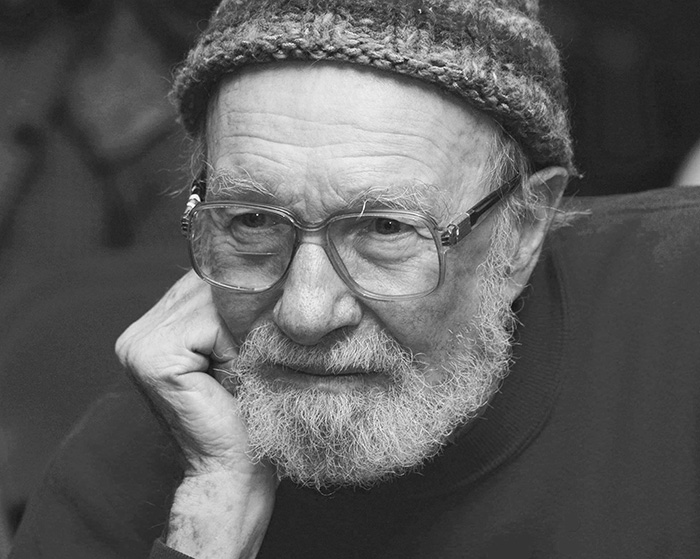-

Pete Seeger at his home in Beacon, New York. November 3, 2005. Photo by Bruce Mondschain. Courtesy of Bruce Mondschain.
Smithsonian Folkways Remembers Pete Seeger (1919-2014)
The Smithsonian community was saddened to learn of the death of Pete Seeger Monday, January 27. Seeger, a venerated folklorist, musician and writer, performed and advocated for causes for more than seventy years.
Seeger was a national treasure, and the Smithsonian Institution is honored to have his recordings in its Smithsonian Folkways collection, which he and his family helped establish and support. Smithsonian Folkways—the Institution’s nonprofit record label—has sixty-seven albums in its collection with Seeger as the lead performer. Seeger and his wife Toshi (1922-2013) also served on the Smithsonian Folkways Advisory Board.
Smithsonian Folkways has created a tribute to Seeger, and members of the public are invited to share thoughts in the online guestbook.
“Pete Seeger showed us how folk music—music of the people, by the people, and for the people—has the power to inspire, to bring us together, and to make us think, through refrains such as ‘Oh when will they ever learn?’ He was a bard, a brother, and a bellwether to us all, a cornerstone of the Smithsonian Folkways record label. We will carry his legacy with us always.” – Daniel Sheehy, director of Smithsonian Folkways Recordings
“Pete Seeger was a giant of our time, and his voice and presence will be truly missed.” – Jeff Place, archivist and producer, Smithsonian Center for Folklife and Cultural Heritage
Seeger was involved in almost every important facet of American music. He was on the board of the Newport Folk Festival and has been a board member of Sing Out!, Smithsonian Folkways, and many other organizations. Since the 1960s, he has been involved in a successful fight to clean up his beloved Hudson River, near his Beacon, New York home. Along with the sloop The Clearwater, Seeger and others have spent years sailing the Hudson to sing songs in support of the river clean up to audiences in towns along the way. He and his wife Toshi ran the Clearwater Festival in New York state each year.
Right up until his death, Seeger continued to compose and perform folk music as well as advocate for social change. In January 2009, he led a crowd of hundreds of thousands sing Woody Guthrie’s “This Land Is Your Land” on the Lincoln Memorial steps during the pre-inauguration concert before Barack Obama became president of the United States.
He was nominated in 2014 for a GRAMMY Award for Best Spoken Word Album. Just days before his death, he helped organize a celebration of Rev. Martin Luther King Jr. in Beacon, New York. He was out there doing what he felt was right, up to the end.
Seeger was a recipient of The Grammy Lifetime Achievement Award (1993), The National Medal of Arts (1994), and the Kennedy Center Lifetime Achievement Honor (1994); he was also inducted into the Rock and Roll Hall of Fame (1996). He earned GRAMMY awards for Best Traditional Folk album in 1996 and 2008, and Best Children’s Album in 2010. In 2008 he earned The Peace Abbey Courage of Conscience Award for his commitment to peace and social justice as a musician, songwriter, activist, and environmentalist. He has also been suggested as a worthy recipient of the Nobel Peace Prize.
Smithsonian Folkways Remembers Pete Seeger (1919-2014) | Smithsonian Folkways Recordings

